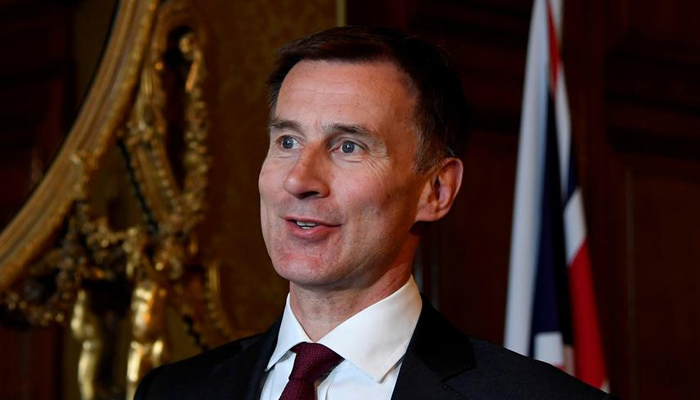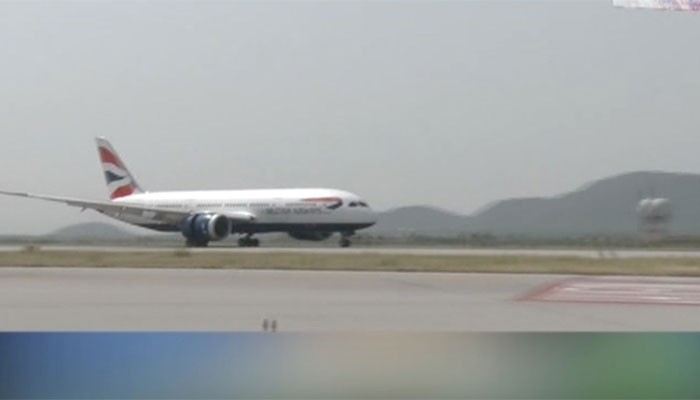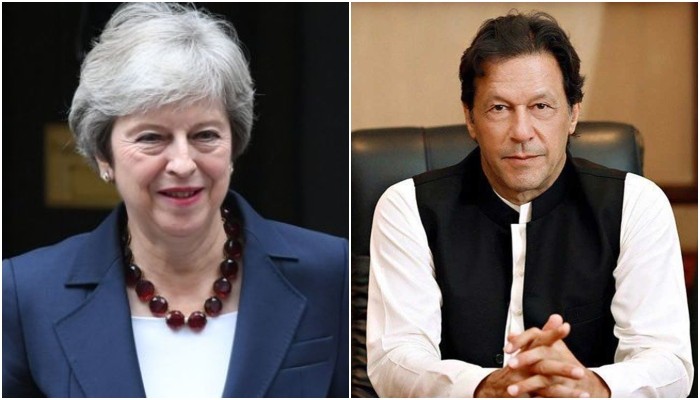UK not to sign politically-motivated extradition treaty: Foreign Secy Hunt
'No extradition treaty the UK will ever sign allowing for the politically-motivated extradition,' British Foreign Secy Hunt said
June 19, 2019

LONDON: Foreign Secretary Jeremy Hunt said Wednesday the United Kingdom would not sign any extradition treaty that could be used for politically-motivated cases.
Speaking at a joint press conference here with Foreign Minister Shah Mahmood Qureshi at the Foreign and Commonwealth Office (FCO), Hunt confirmed the two had discussed the issue of an extradition treaty between the UK and Pakistan.
Both the British foreign secretary and Qureshi answered questions put to them by Geo News and The News on issues of the said extradition treaty as well as the Financial Action Task Force (FATF).
In response to a question, Hunt said: “Let me say it straightforward. No extradition treaty the UK will ever sign allowing for the politically motivated extradition.”
Shah Mahmood Qureshi added: “We don’t want to use extradition for political victimisation; we feel that extradition [treaty] is important.
"We discussed with the Foreign Secretary the impediment in signing this treaty, which was capital punishment. We have resolved that by making amendments in Pakistan’s Penal Code. We have taken the decision of making amendment in that.
"This will not be misused but there’s an environment which needs to be discussed and concluded," he added.
Separately, Qureshi appreciated the UK government's approach on the FATF.
“We had a constructive discussion on the FATF. [The UK government] have stated very clearly that they would not like Pakistan to be pushed in the blacklist.
"In fact, they would want to help us — and we help ourselves — by getting us out of the greylist and we have a clear approach on how to cooperate on that front. The UK delegation has been very supportive in Orlando,” the FM said.
The British Foreign Secretary also commented on the bilateral ties between the UK and Pakistan, saying the personal connection the two countries have was truly extraordinary.
“We had [a] very good discussion about the bilateral trade, cooperation in multilateral arenas, regional tensions, and working together to reduce them.
"The secretary of state for the international trade has increased the support for Pakistan from up to £400 million to £1 billion,” he said, adding he was delighted that British Airways recently restarted their services from London to Islamabad.
Hunt noted that Pakistan and the UK have been great friends for many years and “today is the reaffirmation of that friendship”. He had met Qureshi on many occasions, he added, underscoring that he enjoyed “excellent working relationship with him”.
Qureshi reiterated that both sides had a great discussion on regional issues and how the “PTI [Pakistan Tehreek-e-Insaf] government played a role in defusing a tense situation after Pulwama attack and how this government has played its role in tackling issues of money-laundering, terror-financing, FATF and where Pakistan stands on all these issues”.
Qureshi said there was a huge potential between the countries.
Hunt said he was “very encouraged to see strong commitment of tackling corruption by the Pakistan government, the progress made on FATF, [and] additional progress that can also be made in that area”.
The foreign secretary said there was a “very clear recognition from the Pakistani government that the only way for Pakistan to progress is to do more to tackle this scourge of corruption and I think a lot of progress has been made”.
Qureshi said the PTI had a clear view of tackling corruption, that he understood how important it was, and that it was the PTI’s view that stolen assets should be recovered. He added that his government wished to eliminate corruption through across-the-board accountability.
“Stolen assets should be recovered. We have an assets recovery unit [ARU] functioning in Pakistan. The government is doing whatever it can to deal with the menace of corruption.”














